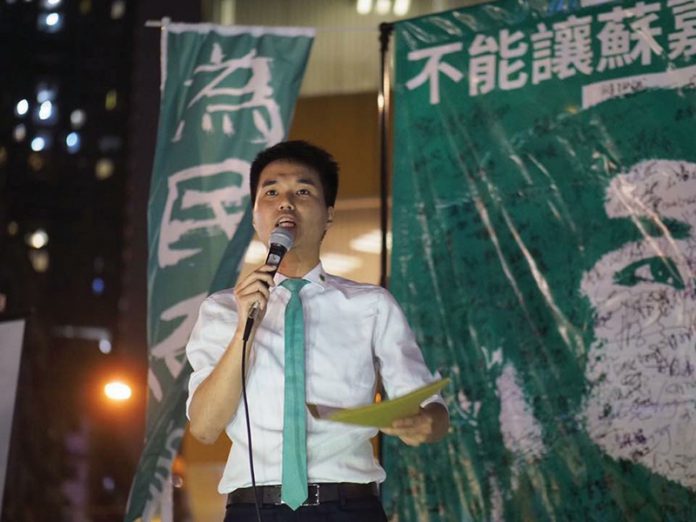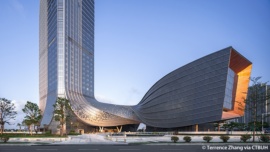Strengthening the overseeing powers of the Legislative Assembly as well as facilitating public supervision of the legislature and the Administration are the main pledges of Sulu Sou Ka Hou, when more than 174,800 residents cast their votes on September 17 to elect him one of the 14 directly elected legislators in the city.
In less than 50 days of being sworn into office, however, when all of his goals have yet to be accomplished, the youngest legislator in the history of the city has hit a wall. In a secret ballot on December 4 the 33-member legislature, dominated by the pro-establishment camp, voted in favour of suspending the mandate of Mr. Sou, who garnered over 9,200 votes in September, due to his alleged ‘aggravated disobedience’ in a protest mounted more than a year ago.
The decision – catching some observers by surprise, while some claim the writing has been on the wall – might further polarise the city’s political spectrum amid Beijing’s declining tolerance of dissident voices in the two Special Administrative Regions. On top of which the legitimacy of the Legislative Assembly, they say, has been dealt a huge blow, putting its past efforts to improve its image in vain.
“Do not give up, keep fighting,” Mr. Sou, aged 26, wrote on his social media account in the wake of his suspension from duty. He cannot propose, deliberate upon, or cast votes on any bills, motions or enquiries, nor can he attend any legislature sessions; the perks of legislators, such as salaries and subsidies, however, can be maintained.
A rising star in the local democratic camp, Mr. Sou has been active in leading local protests and demonstrations for the past few years, including a 2014 movement against generous retirement packages for outgoing officials dubbed the city’s largest protest since the handover in 1999. But it was the 2016 demonstration opposing a donation of RMB100 million (MOP122 million) from the Macau Foundation to Jinan University in Guangzhou, both linked to Macau Chief Executive Fernando Chui Sai On, which landed the legislator in trouble.
 ‘Groundless’ charge
‘Groundless’ charge
Mr. Sou and New Macau Association colleague Scott Chiang Ming Hin were charged with ‘aggravated disobedience’ last March, and face a maximum imprisonment term of up to two years because the prosecutors deemed they refused to listen to police orders concerning “illegal assembly” outside Mr. Chui’s residence at the time.
According to the city’s rules, the prosecution of any offence allegedly committed by a Legislative Assembly member with possible imprisonment of up to three years can only proceed with the legislature’s authorisation, or the proceeding has to be postponed until the end of the legislator’s four-year tenure. The charge ultimately led to the decision of the Legislative Assembly on December 4 – 28 in favour and four against – to suspend Mr. Sou.
“I regretted the decision,” said Sou. “My alleged offence is not about corruption, malfeasance, or organised crime that causes serious harm to the public’s interests but it concerns a protest . . . that could be said to safeguard the public’s interests.”
The legislator maintains he did not oppose or violate any order in the 2016 protest, as he had left the environs of Mr. Chui’s residence following a final police warning. “An offence of aggravated disobedience for simply delivering a petition to the Chief Executive is simply groundless accusation,” he stressed. “The Legislative Assembly has lost its sense of dignity and independence for allowing the unfounded intervention of the Administration to the legislature, suspending the duty of a legislator elected by popular vote.”
Mr. Sou said he believes his trial, which starts on January 9, will clear his name.
Chilling effect
It is commonly believed Mr. Sou may have his mandate suspended for months – or even years – given the lengthy judicial procedures and the possibility of either party appealing to the higher courts. He could resume duty if he is acquitted by the court or handed an imprisonment term of no more than 30 days; if he is sentenced to prison for more than 30 days, the legislature will have to vote on whether he should be ousted.
Since it was made public in November that Mr. Sou was charged with ‘aggravated disobedience’ many government officials have weighed in and stressed the case was not ‘political persecution’. Ip Son Sang, the Public Prosecutor-General, said on a public occasion in December that there was “no political consideration” in the case, and that every step was taken in accordance with the law.
The rationale offered by officials has failed, however, to convince some in society that the accusation was not politically motivated. Jason Chao Teng Hei, a political activist and former president of New Macau Association who is now studying in the United Kingdom, said the Macao Administration and central government are fully aware of the consequences of the charge against Mr. Sou.
The activist claimed he was tipped off in last August during the promotional campaign of Mr. Sou’s ticket for the Legislative Assembly election that there would be a smear campaign against him due to his charge. The charge was only publicised in November.
Making the case known now, after Mr. Sou has been elected, could lead to “more serious consequences . . . [and] . . . create a chilling effect” upon those who dare challenge the authorities, Mr. Chao noted. “It not only targets Sulu Sou but the entire camp of local youngsters striving for democracy.”
 Echo of Hong Kong
Echo of Hong Kong
The case of Mr. Sou has drawn similarities to a series of disqualifications of lawmakers in the opposition camp in Hong Kong in the past year, evidence of Beijing seemingly strengthening its grip on the autonomy of the two Special Administrative Regions. Since independence advocates Sixtus ‘Baggio’ Leung and Yau Wai Ching were ousted from the Hong Kong legislature in November 2016, six legislators in the democratic camp in the Asian financial centre have been unseated over oath-taking controversies.
Eddie Chu Hoi Dick, a Legislative Council member in Hong Kong, was quoted by Hong Kong media as saying that Macau had learned from Hong Kong, with both Administrations using judicial means to suppress the democratic movement in the two cities.
Nonetheless, Leon Ieong U Meng, a lecturer of the Department of Government and Public Administration of the University of Macau, observes differences between the cases in Hong Kong and Macau, as Mr. Sou has not yet been unseated. “The case of Sulu Sou, unlike Hong Kong, does not concern any conflict between Mainland China and Macau,” he said. “Although he was labelled a ‘pro-independent activist’ by various media during Legislative Assembly elections [last] year his political aspirations and actions seem to be mild by international standards.”
The academic, however, was flabbergasted by the decision to suspend Mr. Sou. “The Macau legislature is dominated by the pro-establishment camp, [meaning] Sulu Sou has little impact upon the deliberations of the bill,” Mr. Ieong said. “A seat taken by Sulu Sou can even prove to be improving the image of the Legislative Assembly.”
Dealing blows
While Mr. Ieong does not believe the case will lead to any protests or movements on a scale of the 2014 protest against the lavish retirement packages proposed for officials, the credibility of the government has taken a dent. “[It] invites society, particularly youngsters, to cast doubt on the legitimacy of the local government and legislature, imposing more hurdles for policy implementation and governance in the long run,” he deduced.
The suspension consolidates the bad perception of the legislature among local residents, according to Mr. Ieong’s peer at the University of Macau, Eilo Yu Wing Yat, an Associate Professor of Political Science. A survey published by the Macau Creative Wisdom Development Association and the Macau University of Science and Technology last year showed 59.6 per cent of 456 residents polled gave a failing score (below 60) to the legislature. The average mark of legislators was a mere 46.2 per cent as residents found the legislature lacked independent voices, the survey added.
“The government has just appointed seven legislators to the Assembly, who are mostly scholars and professionals, to improve its ‘rubber stamp’ image,” Prof. Yu said. In the city’s 33-seat legislature, 14 legislators are elected by popular vote, 12 are elected by the votes of representatives of certain sectors, while seven are appointed by the Chief Executive.
“The suspension of Sulu Sou – which was 28 votes in favour and four votes against – shows that when the Administration takes a stance on a matter [post-establishment] legislators fully support government action,” he added. “All the efforts taken to improve the image of the Legislative Assembly are now in vain.”
This view is not shared by indirectly elected legislator Jose Chui Sai Peng, a nephew of the Chief Executive, who believes the case will greatly impact the legislature. “Many legislators are also very critical towards the government; I’m not worried the legislature will become less representative,” he said, adding the suspension of the democratic activist was “a collective decision”.
Back to the streets
While many have been caught by surprise by the suspension of Mr. Sou, it is not the case with Jorge Neto Valente, president of the Macau Lawyers Association, who says the activist “has sealed his fate” by engaging in political movements for a long time and disrespecting the etiquettes and traditions of the legislature, namely publicising the content of closed-door sessions of the Assembly.
“I don’t think the [suspension] will stir any discontent in society,” Valente was quoted as saying by the Portuguese press in December. He did not respond to calls for comment on this story.
The disqualifications and suspension of lawmakers in Macau and Hong Kong illustrate that local authorities and Beijing might have adopted tougher stances on the democratic movements in the two Special Administrative Regions, Prof. Yu said. The opposition camp will not be easily silenced, though. “The situation here will become more polarised after the suspension: more youngsters might take to the streets as they don’t have channels to voice their opinions in the Legislative Assembly,” the scholar noted.
In the wake of Mr. Sou’s case, the New Democratic Association said in a statement that the suspension is not the end of the world. ‘Even though [we] may face more intense political persecution, we will not give up, unswervingly challenging the injustice [of society],’ it read.
Challenging injustice is also a recurring theme in the remarks of Mr. Sou. “I remember I made my first interpellation in the Legislative Assembly about the youngsters who are willing to fight against injustice, are stigmatised or even face political persecution,” he said.
“If the government doesn’t deal with the problems [highlighted by the youngsters] but try to ‘deal with’ the people shedding light on the problems . . . this will affect the future of the [new] generation for the next 20 to 30 years,” he concluded.
 What is aggravated disobedience?
What is aggravated disobedience?
According to Article 312 of the Macau Penal Code, an individual commits disobedience when he or she refuse to comply with orders issued by civil servants or public bodies, hindering the public bodies from fulfilling their obligations. This offence is punishable by imprisonment of up to one year, or maximum fines of 120 days. If the case is more severe, individuals can be accused of aggravated disobedience with a maximum imprisonment term of two years, or fines of up to two years.
This charge has usually been imposed upon those who drive under the influence but local political observers complain the authorities have increasingly used this charge to prosecute protestors in recent years, a claim officials deny. According to figures from the Secretariat for Security, there have been 14 cases of aggravated disobedience in Macau concerning protests and demonstrations since 2014, involving 58 individuals.
In less than 50 days
Prior to his suspension, Sulu Sou Ka Hou had been one of the most talked about legislators in his fewer-than-50-day tenure.
On the first day, right after being sworn into office in October, Mr. Sou demanded all candidates running for the presidency of the Legislative Assembly explicate their platforms before casting ballots, an unprecedented call unsurprisingly rejected by fellow legislators.
Compared with other legislators, who usually sit to deliberate upon bills and motions during plenary meetings, Mr. Sou, with academic-cum-legislator Agnes Lam Iok Fong, has spent most of the time standing when speaking up.
As his Association, New Macau Association, has been calling for all subcommittee meetings of the Legislative Assembly to be open to the media and live television broadcasting for years, he also made the same request in the legislature, which was turned down. Describing the closed-door meetings as a “black-box operation,” Mr. Sou posted the content of the meetings on his social media account, a move that has been lambasted by other legislators as “disrespectful”.
But his interaction with Chief Executive Fernando Chui Sai On at the Policy Address session in November has probably left the most indelible impression with the public. In the Q&A session with Mr. Chui he demanded the city’s top official be held accountable for the devastation of the gambling enclave at end-August when Typhoon Hato rampaged the territory causing 10 fatalities.
Dissatisfied with the Chief Executive’s answer, Sou told the official directly during a cordial handshake after the session: “You must admit, you have to be held accountable.”
Different fates
Sulu Sou Ka Hou is not the first legislator here to have faced criminal charges during his four-year tenure, but his predecessor ended up with a different fate.
Businessman-cum-legislator Tommy Chan Kai Kit, also known as Chio Ho Cheong, was accused of employing illegal workers in 1997 before the handover. But the legislature at the time voted 21 against, one abstention and one in favour of his suspension motion, meaning the judicial proceedings of his charge had to be postponed until the end of his mandate.
Mr. Chan, who was involved in the campaign finance scandal of former United States President Bill Clinton in the 1990’s, only kept his seat for two more years before going missing in April 1999, allegedly for fraud concerning Hong Kong companies. His empty seat was later occupied by Iong Weng Ian, Vice-president of the Women’s General Association of Macau, via a by-election among a 200-strong special committee.
























